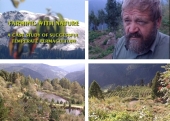Xisca Nicolas wrote:Is Holzer ecology absolutely linked with moving earth with caterpilars, making artifical ponds and so on? I can see results that are self-keeping, but is it always with a lot of input at the start?
This is a great question. The only thing that Holzer Agroecology is absolutely linked to is nature. Reading the landscape you begin to develop a vision for what is possible, or what has existed in the past.
Sepp has gone to places before that he has recommended to not do a thing to the landscape. In the Redwoods last year he recommended very light earthworks, it was more important to care for and use the resources that are already available there.
The big machinery is used to repair landscapes that have been degraded and abused by our management. Hillsides have been logged, wetlands have been drained, in many cases it was these very machines causing the damage. You can't repair the damage of a 30 ton excavator with a shovel.
It is time for us to start repairing the damage that our species has inflicted. Using some of the last of our petrol to reshape the earth and repair it's water holding capacity is in my opinion one of the best gifts we can leave future generations. Sepp is never making an "artificial" pond, ponds are only possible when the landscape provides the opportunity for one. In most cases this is recreating water retention structures that were naturally in the landscape, before our abuse and mismanagement.










